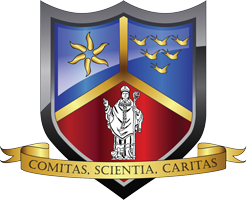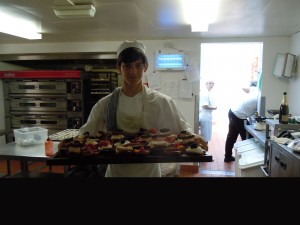Careers
Introduction
At St Richard’s, Careers Education and Guidance is the preparation of our pupils for their lives beyond full time education and is available for all pupils. Our aim is to inspire and motivate you, and provide you with the information, advice and guidance you need to help you take control of your learning and future working life. We know that everyone has the ability and potential to develop and grow in their lives and careers, but we understand that sometimes things get in the way and can hold you back. As a college we are here to help you identify and overcome these barriers and achieve your potential.
Careers Lead: Mrs Adams (mrsadamsc@strichardscc.com)
Contact number: 01424 731070
View our Provider Access Policy here
View how the school measures and assesses the impact of the careers programme on pupils here
Next information review: July 2022
Pupil Opportunities for Careers Education and Guidance
As a college we will work with your child to support them in making the best transition in and beyond St Richard’s. The majority of the Careers Education, Information and Guidance will be provided via PSHEe lessons.
By the end of Year 9 you will:
- been able to use and have regular access to the careers section in the library
- known how to make decisions about your choice of GCSE subjects
- begun to recognise what skills and strengths you have and how you can use them e.g. working as part of a team, working to a set deadline
- received advice and informed support on careers options and GCSE options via staff such as your Form Tutor, Pastoral Leader and Careers Lead
- used careers based websites to begin to find out more about the types of work in which you are interested
- had opportunities for recording your own achievements e.g. reaching your target grades in subjects
- Had an opportunity to meet employers via careers workshops and the careers fayre
By the end of Year 11 you will:
- been able to use and have regular access to the Careers section in the library
- known how to make decisions about your choice of higher education options
- a knowledge of a wide range of further and higher education, training and career opportunities
- recognised what skills and strengths you have and how you can use them e.g. working as part of a team, working to a set deadline
- received advice and informed support on careers options and GCSE options via staff such as your Form Tutor Pastoral Leader and Careers Lead
- used websites careers based websites to begin to find out more about the types of work in which you are interested
- had opportunities for recording your own achievements e.g. reaching your target grades in subjects, achieving prefect status. Both of which can be recorded in your progress files
- had the chance to do work experience
- begun to develop self-awareness skills for self-reliance and dealing with the world of work and everyday life e.g. working with different groups of people from varying backgrounds
- had the opportunity to meet a variety of adults other than teachers at careers talks, visit and interviews. An example of this is in Year 10 when you have your work experience preparation morning and have an individual MOCK interview with an employer
Staff
- Work with pupils, parents and employers to raise aspirations and provide experiences across the curriculum to link learning with the workplace
Parents
- Attend and support school events
- Support children with aspiration
- Visit the school to give talks about the world of work
 Career Share is a new campaign to encourage parents and carers across Sussex to engage with and support their school’s careers activities.
Career Share is a new campaign to encourage parents and carers across Sussex to engage with and support their school’s careers activities.
Parents and carers are the biggest influencers on young people’s aspirations and conversations about careers can have a positive impact on grades, motivation to study and attitude to success.
By sharing stories about your career and life path you can make a positive impact on the lives of young people.
St. Richard’s Catholic College is looking for parents and carers to take part in a range of activities to help prepare our pupils for life beyond school. There are lots of ways you can get involved, some only taking 5 minutes of your time!
Whatever path you have taken you can inspire, education and encourage young people by sharing the knowledge, networks and experiences you have gained along the way.
Please contact Mrs Adams, mrsadamsc@strichardscc.com to find out how you can support our pupils.
Follow Get Career Confident’s careers page for parents and carers in Sussex @Get-Career-Confident on Facebook and visit our website www.getcareerconfident.co.uk for lots of useful careers information.
Governors
- Attend school events
- Visit the school to conduct mock interviews
- Support the careers programme
Employers
- Attend school events
- Visit the school to give talks
- Invite pupils in for workplace visits
- Support work experience
Alumni (ex-pupils)
- Attend school events
- Visit the school to give talks on life after St. Richard’s
For more information on the school’s career programme, and how you can get involved, please contact Mrs Adams, Careers Lead – mrsadams@strichardscc.com
Links:
Downloads:
-
Morrisby
-
National Careers Service
-
Connexions 360
-
Talking Futures
-
Oxplore
-
SJC Inspire
-
Make the Future Yours
-
Free student advice on Oxbridge Applications
-
Learn Live
The National Careers Service provides information, advice and guidance to help you make decisions on learning, training and work opportunities. The service offers confidential, helpful and impartial advice, supported by qualified careers advisers.
https://nationalcareersservice.direct.gov.uk/Pages/Home.aspx
Downloads:
This website is maintained by East Sussex County Council and it contains a broad variety of information, local and national. It is the key site for updating young people on key areas of concerns (e.g. travel grants) and providing links to local support services or providers. It also has links to some of the vital national websites such as the National Apprenticeship Service.
Help to find and land your dream job talkingfutures.org.uk
Oxplore is an innovative digital outreach portal from the University of Oxford. As the ‘Home of Big Questions’ it aims to engage those from 11 to 18 years with debates and ideas that go beyond what is covered in the classroom. Big questions tackle complex ideas across a wide range of subjects and draw on the latest research undertaken at Oxford. Oxplore aims to realise aspirations, promote broader thinking and stimulate intellectual curiosity.
https://sjcinspire.com/
Applying for college
Choosing your subjects
Find out which A levels you need to get to the next step? E.g. what do you need to get onto the university course / career you want?
Do an internet search for the course requirements for you chosen course/career.
It is always worth finding out what universities generally want for their courses or for specific courses; you can find this information by searching on the UCAS website: https://www.ucas.com/
You can also look at the requirements for the Russell Group Universities:
https://www.informedchoices.ac.uk/
A good suggestion is to choose 3 subjects relevant to your career or university choice and 1 subject you know you will enjoy which might not be relevant – to keep your enjoyment levels up. Colleges often like you to choose 4 subjects and perhaps drop one course if you find it too hard.
Think about doing an apprenticeship at college, most colleges offer them. Please refer to the page on apprenticeships for more information.
Choosing your College
Have a look at the colleges in the local area, consider:
- Do they run the courses you need to do?
- Can you afford to travel to the college each day?
- Can you get up early enough to get there?
- Don’t worry if your friends are not going to the college you are thinking about, you will probably make new friends anyway.
- Go to the open evenings / guided tour days. If you miss these, contact the college and go and see it anyway.
Trying using the UCAS progress website, you can explore and compare the courses available at colleges, sixth forms and training providers across the local area. You can search by postcode, subject, and school, college or work-based learning provider for courses for 16-19 year olds.
Applying to a College
Talk about your college application with your parent / carer and get them to check your application for errors / spelling mistakes.
Most applications are made through the UCAS progress website. You will have received your username and password via email. Please ensure that you have had your application checked before you submit.
Appenticeships
Depending on the apprenticeship offered, you can earn money while being trained on the job and get qualifications including a degree, A-levels, NVQs, etc.
The apprenticeship website is huge as it is for apprentices, employers, parents, colleges and more, so here are some sections you might be interested in if you just want a quick look:
- Types of apprenticeship – if there are no current vacancies, remember to register and set up an email alert.
- Videos & Pictures – videos of interviews and images in the media gallery
- Search for an apprenticeship in the local area by searching for Apprenticeship / East Sussex
- Newsletter
- Apprenticeships on Twitter – Follow @Apprenticeships
- Apprenticeships on Sussex website
Links:
https://www.findapprenticeship.service.gov.uk/apprenticeshipsearch
Labour Market Information
Employability
What is employability?
Employability skills are defined as:
“A set of attributes, skills and knowledge that all labour market participants should possess to ensure they have the capability of being effective in the workplace – to the benefit of themselves, their employer, and the wider economy”.
- Academic skills: includes specialist knowledge, ability to apply knowledge, logical thinking, critical analysis, and problem-solving, written and spoken communication, ability to use numerical data, computer literacy and research skills.
- Personal Development Skills: includes self-confidence, self-discipline, self-reliance, awareness of strengths and weaknesses, creativity, independence, knowledge of international affairs, desire to go on learning, ability to reflect, reliability, integrity, honesty and regard for others.
- Enterprise or business skills: includes entrepreneurial skills, ability to prioritise tasks, time management, interpersonal skills, presentational skills, ability to work in teams and leadership skills, commercial awareness, flexibility, innovation, independence and risk-taking.
So what does employability mean for you?
Employability is about much more than just getting your first job – it’s about having a positive self-image and presenting yourself successfully, both as you leave school and throughout your life.
Your skills, knowledge and personal attributes and the ability to convey them effectively all contribute to your employability as do your personal circumstances and labour market conditions.
You probably already know that you need to get good results, complete some work experience and improve your skills in order to get a good job. As part of this process you will take part in a mock interview in Year 10.
Work Experience
Year 10 pupils have an one week block placement in the summer term. This week is particularly valuable as it really gives you a chance to experience the world of work. The week should not necessarily be thought of as a ‘Career Taster’ week, as there are some organisations that will not take pupils under the age of 16.
All placements are organised via the Aspire database and you will have a username and password issued to you.
https://aspire.eastsussex-brighton.org.uk/wexpupilchoiceslogin.aspx?aspirenetview=student
Qualifications Framework
Volunteering
Volunteering is simple. It is about giving your time to do something useful, without getting paid. It is a useful way of getting experience which is so valuable when applying for jobs. It can also be a great way to: meet new people, learn new skills and gain useful experience.
The range of opportunities is huge and there is no age limit. Whatever skills and experience you have, there is something that you can do.
Once you start volunteering you should usually expect:
- a clear idea of what your role will be
- appropriate training and support
If you are not clear about anything, do not be afraid to ask someone.
Top Tips
Hints to help you start volunteering:
- Think about what you want from volunteering: new skills, fun, a chance to contribute to a cause?
- Think about what you have to offer: enthusiasm, work skills, life skills?
- Work out roughly how much time you have to give, and how many times a week or month.
- Remember that anyone can volunteer: whatever your skills, experience or background you should be able to find an opportunity.
- Ask questions: do not be shy about asking questions as you go through the process of applying for an opportunity.
- Just try it: often the most difficult part of volunteering is making the first move, so be brave!






